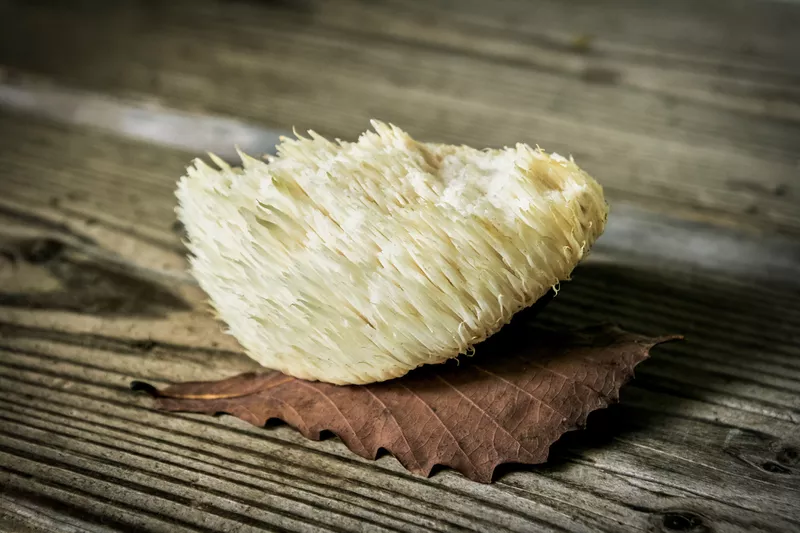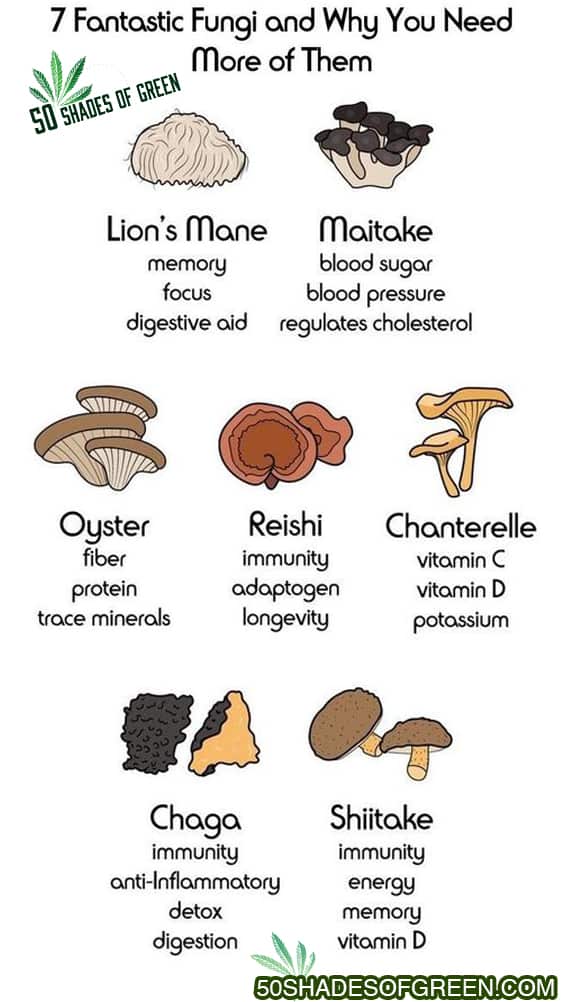Lion’s Mane Benefits: a Guide to This Unique Mushroom

Lion’s Mane mushroom is an ancient Chinese remedy traditionally used for improving cognitive performance, and overall health. It may prevent and treat nerve damage by boosting Brain Nerve Growth Factor, and neurogenesis – the process by which new neurons are formed in the brain.
What can Lion’s Mane do for you?
Lion’s Mane may help improve focus and attention, boost thinking, repair brain cells, help depression and anxiety, and manage other neurological problems like Alzheimer’s, dementia, Parkinson’s, and muscular dystrophy. [1]
Lion’s Mane may help in these ways:
Potentially stimulates Nerve Growth Factor (NGF) in the brain. May prevent and treat nerve damage in the brain. Once past the blood-brain barrier, Lion’s Mane stimulates enzyme production that releases Nerve Growth Factor (NGF). Nerve regeneration helps relieve neurodegenerative disease symptoms such as Alzheimer’s, dementia, and Parkinson’s Disease. Neurogenesis. Lion’s Mane stimulates the repair and creation of neurons. Boosting neurotransmitters and signaling that affect memory, learning, recall, and mood. Brain optimization. Lion’s Mane may help eliminate brain fog, restoring memory and mental alertness. It may improve anxiety and depression symptoms.
Here are some extra readings about the benefits of Lion’s Mane:
- Provides mood support
- Supports overall cognitive health
- Enhances nerve-growth factor
- Promotes healthy blood sugar
- Promotes increased energy levels
Digging Deeper into Lion’s Mane
Lion’s Mane (Hericium Erinaceus) is an ancient Chinese medicinal mushroom with powerful properties proven to improve brain health, enhance cognition, and protect the brain against injury, disease, and the effects of aging. It is quickly becoming universally recognized as a supplement that provides a wide array of benefits. [2] It grows naturally in the wild in Europe, Asia, and North America – beginning to grow in the late summer through the fall, primarily on hardwood trees.
It is certainly a unique and exceptionally promising natural nootropic that belongs to the edible tooth fungi group. It is sometimes referred to as ‘bearded tooth mushroom’, ‘hedgehog mushroom’, and even ‘pom mushroom’ because of its long dangling clusters of spines.
These mushrooms are also prized for their nutritional and culinary qualities. They are typically dried and ground into a powder to make Lion’s Mane mushroom capsules. The extract for the capsules is made from the whole mushroom that you can see above the ground by breaking down the cell walls of the mushroom with hot water in order to get to the beta-d-glucans trapped within the cell walls. Lion’s Mane Mushroom has been recognized as potentially stimulating Nerve Growth Factor (NGF) in the brain.
Known for its powerful effects as a “brain tonic”, Lion’s Mane is said to have been used as a tea for thousands of years by Buddhist monks to enhance brain power, and heighten their ability to focus during meditation.
Lion’s Mane may be a powerful catalyst for brain cell regeneration helping improve memory and cognition.
The primary active compounds in Lion’s Mane are hericenones and erinacines. Hericenones help your brain produce more Nerve Growth factors (*). And erinacines easily cross the blood-brain barrier to boost the production of neurons (*).
How does Lion’s Mane feel when you take it?
You may not experience the effects of supplementing with Lion’s Mane Mushroom immediately. But with the continued use of Lion’s Mane, many users report a boost in mood and mental energy.
Some report it increases depth perception and an improvement in sense of smell. Others testify to improved decision-making, the ability to solve problems and learning. These statements suggest Lion’s Mane has the ability to improve neuroplasticity. [1]
The overall consensus is that Lion’s Mane has the ability to lessen anxiety, reduce depression, and improve concentration. [1]
Recent research on Lion’s Mane mushroom
Lion’s Mane prevents cognitive dysfunction
In this study, researchers examined the effects of Lion’s Mane on amyloid β(25-35) peptide-induced learning and memory deficits in mice. Amyloid β(25-35) peptide is implicated in diseases like Alzheimer’s.
Mice were injected with the peptide on days 7 and 14 of the trial. And they were fed a diet containing Lion’s Mane over 23-days of the experiment. The results showed that Lion’s Mane prevented short-term and visual recognition memory reduction normally induced by amyloid β(25-35) peptide.
They concluded that Lion’s Mane Mushroom “may be useful in the prevention of cognitive dysfunction”. [1]
Lion’s Mane induces Nerve Growth Factor
In this trial, mice were fed Lion’s Mane 5% freeze-dried powdered extract for 7 days. Researchers found an increase in the level of Nerve Growth Factor (NGF) in the brain of the mice. Concluding that Lion’s Mane “contains active compounds that stimulate NGF synthesis”. [1]
RELATED: MDMA Therapy And Psilocybin Therapy Bill Approved By Connecticut
Lion’s Mane Repairs Nerves
In this study done with rats, Lion’s Mane extract was able to promote neuron regrowth after injury. Rats with damaged nerve cells were able to walk again after consuming water containing Lion’s Mane extract.
The researchers concluded that Lion’s Mane regenerates damaged nerve cells. In this case, the reversal was so profound, that the rats went from being totally disabled to walking again. [1]
Lion’s Mane side effects
Lion’s Mane Mushroom is non-toxic and considered very safe with few side effects reported. However, Lions mane side effects have been increasingly searched on Google. All individuals may react differently, which is why it’s vital to always consult your doctor before trying any nootropic or other health-related supplement.
Some people report itchy skin from higher doses. Likely attributable to a boost in Nerve Growth Factor.
Lion’s Mane has been tested in animals showing no side effects or toxicity even up to 5 grams per kilogram. [1]
Dosage
If you take Lion’s Mane mushroom as a dietary supplement, we recommend you to take 1 – 2 capsules per day.
Where to Buy Lion’s Mane mushroom
There are a few companies that have an extremely good reputation with lab results and purity. We are currently working with one of the largest nootropics manufacturers, so we can provide the best lions mane supplement with our resources. Some wonder if they can purchase a lion’s mane grow kit, which is possible but takes passion and dedication.
References
[1] Tomen, David (2020). Secrets of the Optimized Brain: 92 Nootropics to Unlock your True Brain Potential. Nootropics Expert (3rd Edition). [available at: nootropicsexpert.com]
[2] Neuronal Health – Can Culinary and Medicinal Mushrooms Help?
[3] Neurological Activity of Lion’s Mane (Hericium Erinaceus)
[4] Reduction…by 4 Weeks Hericium Erinaceus Intake
[5] Improving Effects of the Mushroom Yamabushitake (Hericium Erinaceus) on Mild Cognitive Impairment: a Double-Blind Placebo-Controlled Clinical Trial
[6] Nerve Growth Factor-Inducing Activity of Hericium Erinaceus in 1321N1 Human Astrocytoma Cells
[7] Antihyperglycemic and Antihyperlipidemic Activities of Aqueous Extract of Hericium Erinaceus in Experimental Diabetic Rats
[8] Anti-Fatigue Activities of Polysaccharides Extracted from Hericium Erinaceus
[9] Hericium Erinaceus
Further information
Examine.com ArticleWikipediaHealthlineBraintropic
The post Lion’s Mane Benefits: a Guide to This Unique Mushroom appeared first on Nootropics.com.








